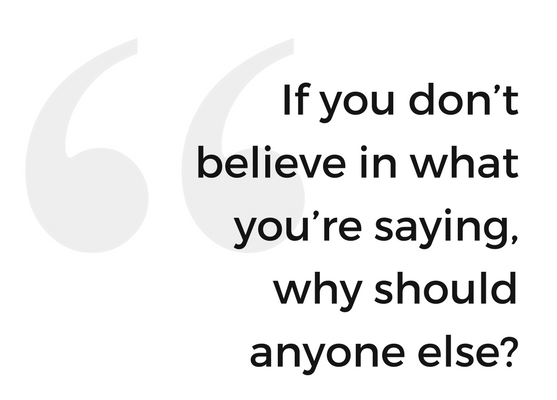 our voice is an incredible source of power, and yet many of us run into a few key inhibitors that keep us from conveying our message with confidence.
our voice is an incredible source of power, and yet many of us run into a few key inhibitors that keep us from conveying our message with confidence.
Whether it’s struggling to speak up in a meeting, wrestling with shyness, or fear of public speaking, the first step to unlocking our voice is to understand what is getting in the way of using it.
Blocks to Powerfully Wielding Your Voice
Internal Noise
Our brains are amazing processing networks, but the constant noise of our thoughts can get in way of us presenting our most powerful selves. Thoughts trigger emotions and emotions trigger physical reactions (like a racing heartbeat or sweaty palms), which can in turn keep us from speaking up at the board meeting or not pursuing that opportunity to speak on stage. Often, we become our own worst enemy by getting caught up in our thoughts.
 External Noise
External Noise
This can come from a couple of different sources. Maybe there are more dominant voices in your professional or social sphere that drown out the rest, including your own. These could come from peers, or even from overzealous leaders. Maybe there are distractions that fall much closer to your comfort zone, which seem more appealing than the situations that challenge and intimidate you.
Notice which noises — both internal and external — most often get in the way of you using your authentic voice, and take an action to address this.
Lack of Clarity
Not having clarity on what you want to say is also a sneaky voice inhibitor. Are you super clear on what are you using your voice for? Who will benefit from your words? What is the most important element of your message?
Keys to Unlocking Your Voice
If you find yourself inhibited by some of the blocks mentioned above, read on for tips on how to use your voice with confidence.
1. Be Clear About Your Message
Get clear on your commitments, and hence the message(s) that you intend to deliver. See my article on achieving your future vision for more on this. The bottom line is that in order to use your voice powerfully, you need absolute clarity on the message you wish to convey, regardless of your audience. If you don’t believe in what you’re saying, why should anyone else?

2. Identify Your Fears
Imagine yourself in a situation — real or hypothetical — in which you are speaking outside of your comfort zone. Notice what comes up for you. If it’s an “I don’t want to do this!”, respond by asking, “Why not? What am I scared of?” Notice the stories behind your thoughts and emotions. Recognize that these are only stories, and not your reality.
3. Know How to Recharge
But what if you’re an introvert, and speaking feels exhausting? Just because you’re introverted doesn’t mean you can’t present with confidence. As an introvert, you may find that using your voice in certain kinds of venues or formats drains your energy, and that’s OK. You just need to make sure you know what to do to get recharged, and do it!
4. Expand Your Comfort Zone
If speaking up feels uncomfortable to you, make the conscious choice to expand your comfort zone. Join a Toastmasters International Club. Take an improv class. Take on any activity that involves physically using your voice that is markedly outside your regular behavior. This will help you to build a foundation of trust and confidence within yourself, which you can return to whenever you feel unsure of your voice.
5. Hire a Professional
Sometimes being able to work 1-on-1 and get personal feedback will allow you to make leaps and bounds in this area. Depending on your goals, you could look at working with a voice coach, a leadership coach (like me!), a public speaking coach, or even a marketing consultant, if getting your voice through the outside noise is your primary aim.

6. Develop a Culture of Shared Leadership
Whatever level you’re working at, do what you can to develop a culture within your company or organization (and in your community!) where all voices are valued and cultivated. A world where more voices are accepted and truly heard is one where creativity and confidence flow freely.
Contact Sean to learn more about how to harness your own confidence.



